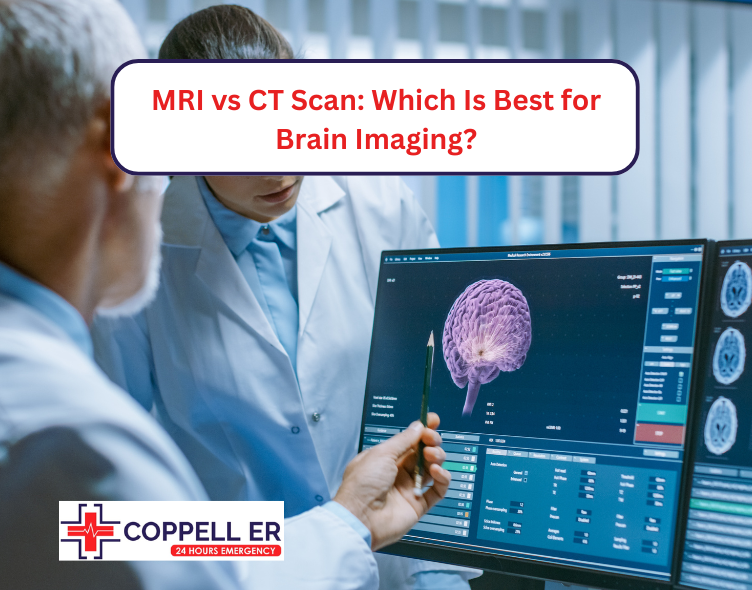Introduction
When you’re facing a head injury, seizure, or unexplained headaches, your doctor might recommend a CT or MRI scan. Both imaging tools help uncover what’s going on inside your brain. But choosing the right one can be confusing. Understanding the difference between CT vs MRI of head can help you feel more confident in your care.
What is a CT Scan?
A CT scan, short for Computed Tomography, uses X-rays to produce detailed images of your head. It takes multiple cross-sectional pictures (slices) and compiles them into a full 3D view.
Key Features:
-
Quick imaging (a few minutes)
-
Excellent for detecting bleeding, skull fractures, or trauma
-
Often used in emergency rooms like ER OF COPPELL
Alt text: “CT scan machine showing a patient head being scanned”
Caption: “CT scan in progress – quick and vital for emergency head assessments”
What is an MRI Scan?
An MRI (Magnetic Resonance Imaging) uses strong magnetic fields and radio waves to create highly detailed images, especially useful for soft tissue.
Key Features:
-
No radiation
-
Better soft tissue contrast (brain, nerves)
-
Can take 30–60 minutes
-
Not ideal for patients with metal implants
Alt text: “MRI machine in a hospital with brain scan in progress”
Caption: “MRI provides a detailed image of brain tissues using magnetic technology”
CT vs MRI of Head: Side-by-Side Comparison
| Technology | X-rays | Magnetic field & radio waves |
| Scan Time | 5–10 minutes | 30–60 minutes |
| Radiation | Yes | No |
| Best For | Trauma, bleeding, skull fractures | Tumors, soft tissues, brain injuries |
| Emergency Use | Preferred | Less common |
| Cost | Generally lower | Generally higher |
| Metal Implant Safe? | Yes | No |
| Image Clarity | Good for bone & blood | Excellent for soft tissues |
When to Choose a CT Scan for Head?
CT scans are ideal in emergencies when time is critical. At ER OF COPPELL, we often perform CT scans for:
-
Head trauma or car accidents
-
Suspected bleeding or stroke
-
Severe headaches
-
Skull fractures
A CT scan can quickly detect internal bleeding or fractures, making it life-saving in urgent care settings.
When to Choose an MRI for Head?
MRI is preferred for more in-depth studies where detailed brain imaging is needed. It’s recommended when:
-
Evaluating brain tumors
-
Diagnosing multiple sclerosis (MS)
-
Investigating long-term migraines
-
Studying brain development (especially in children)
At ER OF COPPELL, we collaborate with imaging centers to refer patients when MRI is the best diagnostic tool.
How ER OF COPPELL Helps You Decide
Our board-certified emergency physicians evaluate your symptoms carefully. We consider:
-
Time sensitivity
-
Safety (metal implants, pregnancy)
-
Clinical urgency
-
Insurance and costs
ER OF COPPELL ensures that you get the right imaging test at the right time. Whether you need a CT immediately or an MRI referral, we guide your care professionally.
Risks and Safety Considerations
CT Scan Risks:
-
Radiation exposure (minimal but present)
-
Not suitable for pregnant women unless urgent
MRI Risks:
-
Claustrophobia or discomfort during long scans
-
Cannot be used with certain metal implants (pacemakers, aneurysm clips)
-
May require contrast injection (check for allergies)
FAQs
1. Is CT scan or MRI better for headaches?
If the headache is sudden or severe, a CT scan is preferred. If it’s chronic or related to neurological symptoms, an MRI may be more useful.
2. Can I get an MRI if I have metal in my body?
Not always. Inform your doctor about implants, pacemakers, or metal fragments. CT scans are safer in such cases.
3. Is MRI painful?
No, it’s painless. However, you must lie still inside a tube-like machine, which can cause discomfort for some.
4. How long does it take to get results?
ER OF COPPELL usually provides CT results within minutes. MRI results may take longer, depending on the referral center.
5. Do I need both CT and MRI?
In some complex cases, yes. Your doctor might order both to ensure a complete diagnosis.
Conclusion
Choosing between a CT scan and an MRI for head evaluation depends on your symptoms, urgency, and health history. While CT is faster and excellent for emergencies, MRI gives unmatched detail for soft tissues. At ER OF COPPELL, we are committed to providing you with safe, accurate, and timely diagnostics, ensuring you receive the best care possible.
Whether you’re dealing with trauma, unexplained headaches, or neurological symptoms, our team is here to guide you every step of the way.


 :
: